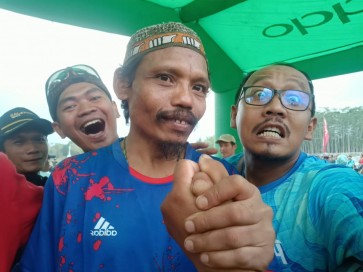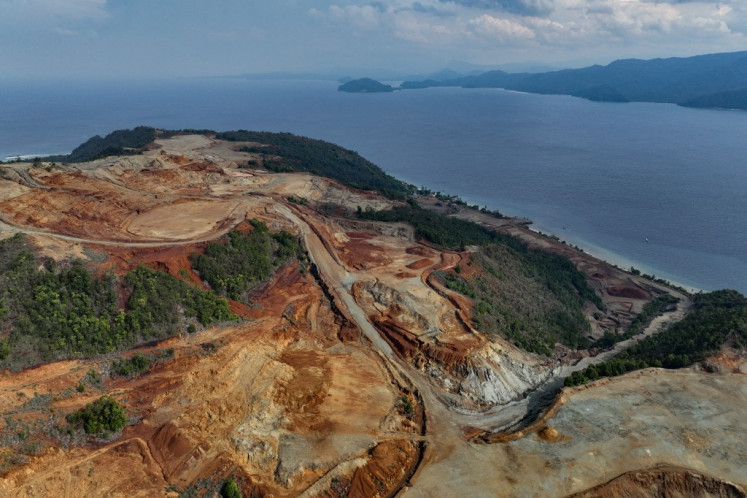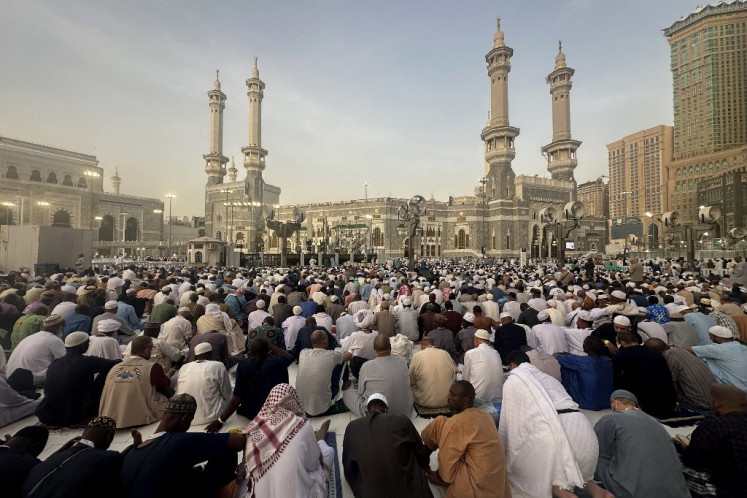Christian Mara: Preserving Dayak art and culture
(JP/Nurni Sulaiman)His fingers quickly moved across the sampeq, a typical stringed musical instrument of Kalimantan, while he flashed a radiant smile
Change text size
Gift Premium Articles
to Anyone
 (JP/Nurni Sulaiman) (JP/Nurni Sulaiman)
(JP/Nurni Sulaiman) (JP/Nurni Sulaiman)
(JP/Nurni Sulaiman)
His fingers quickly moved across the sampeq, a typical stringed musical instrument of Kalimantan, while he flashed a radiant smile.
Christian Mara, 46, an ethnic Dayak from Jangkang district, Sanggau regency, West Kalimantan, is soft-spoken and very hospitable. He has dedicated almost his whole life to art and music without expecting any reward.
'Come on let's pose together, don't be shy,' he said, inviting visitors wanting to have their pictures taken with him at the West Kalimantan pavilion of an expo organized for a week in Palladium Mall, Medan, North Sumatra, recently.
Mara, clad in Dayak traditional dress and playing a sampeq, cut an interesting figure for expo visitors. The sacred and calming tone of his instrument hypnotized the crowd, drawing them even closer.
Mara is a true artist. The sampeq he plays is the result of his own craftwork. He also writes his own songs. For decades, he's made other Dayak traditional musical instruments, including drums, flutes, gongs and metallophones, besides Malay stringed instruments. Moreover, Mara has also created Dayak semi-modern dances and is an able dancer himself.
Skilled crafters of Dayak and Malay traditional musical instruments have been rarely found in West Kalimantan in the last 10 years and their raw materials are also becoming scarcer. It takes quite long to produce such instruments but the number of buyers is also limited.
Instead of being driven to despair, Mara has found a way of overcoming the difficulty. He has produced musical instruments with types of wood that are widely available, such as the wood of jackfruit, cempedak (Arthocarpus Champeden) and tengkawang trees.
'Now there's only a few makers of complete sets of Dayak and Malay musical instruments. Traditional instruments may disappear so I'm continuing to produce them,' revealed Mara.
He learned to craft traditional instruments through observing. In 1985, along with his family members and friends in Rosak hamlet, Pisang village, he went to Jangkang district to watch art performances in an annual program to mark Independence Day.
They had to walk for over six hours to enjoy the event in Jangkang. According to Mara, some people from remote areas had to make a two-day trek for the celebration. 'The road is in bad repair. Our village hasn't been touched by development,' he said.
The art shows Mara's interest in traditional musical instruments and his motivation to make a sampeq for the first time by using jelutung (Dyera constulata) wood. With the instruments he crafted, Mara learned to play music along with his village peers.
Previously, he was a primary school dropout and had to walk to the district capital to meet with the principal of a local junior high school to apply for entry, where he was accepted as a student. Sadly, however, Mara, who once aspired to be a soldier, only managed to study for six months as his parents could not afford to support him, although he had a part-time job in the evenings.
Later, Mara served as a migrant worker at a plywood factory in Malaysia. He also worked in Hong Kong for two years aboard a ship of the Hong Kong police. There, he became trapped in a mafia narcotics ring, operating as a young drug courier.
Realizing the danger of his work in Hong Kong, Mara quit and returned home in 1980. Two years later he tried his luck in the provincial capital of Pontianak, due to vacancies for civil servants in the city's Supadio Airport. However, his primary school diploma failed to qualify him for the position.
Mara finally found his way in music and returned to Pontianak to set up a studio in 1986, which became the embryo for various musical studios in the province. He named this studio 'Bengkawan' after the highest mountain in his village, which is located in Gang Ringin Sari 1 on Jl. A.Yani, Pontianak.
The father of two children now has two art studios. The other, Tabai Ogong, is located at his residence in Wonodadi, Arang Limbung village, Sungai Raya district, Kubu Raya regency, West Kalimantan.
Thanks to his dedication to art and music, he has travelled to different countries like Malaysia, Thailand, Brunei and Australia, where he presented his dance compositions and songs from his many albums. Mara also received a Cultural Award in 2009 from President Susilo Bambang Yudhoyono for cultural preservation and development.
Today, Mara is writing new songs, such as 'Sanggau Membangun' (Sanggau Building Up) and 'Amoi Pasir Panjang' (Pasir Panjang Chinese Girl), which will be available in Iban Dayak/Sanggau, Malay and Chinese languages.









